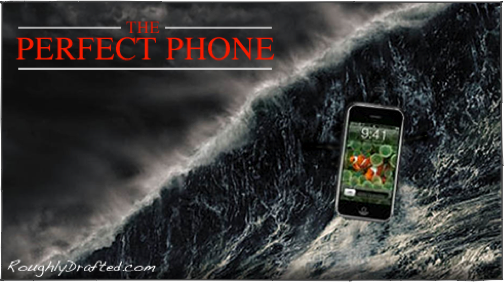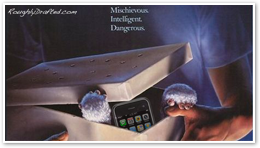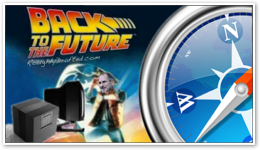


Apple has dropped just enough information at just regular enough intervals to create a level of anticipation for the iPhone that can only be described as off the hook. Amid all the opinions--and the frantic warnings of doom from certain analyst groups--are a few details that have been largely overlooked.
Here's a deconstruction of a few myths that have failed to take these unhidden secrets into consideration, along with the final aspect of why Apple released Safari for Windows, as I promised to reveal in the last article. It has something to do with the iPhone, of course.
Segway Segue, or AirPort Runway?
The levels of both enthusiastic hype and detractors’ hate over the iPhone appear to have handily eclipsed one of the last ultra-hyped new devices of the tech world: Dean Kamen's Segway personal transporter.
Back in 2001, the Segway was presented sight unseen as the mysterious, revolutionary invention Ginger. It was privately shown to a handful of luminaries--including Steve Jobs--who all seemed excited about its potential. When actually revealed to the public, it was met with a mix of interest and ridicule, in part due to its steep price tag. After all, if you can't afford it, it must be silly and impractical.
 Kamen's claim that the Segway would change society and that cities would be reconfigured to account for a world mobilized by two wheeled robot transporters didn't work out as planned.
Kamen's claim that the Segway would change society and that cities would be reconfigured to account for a world mobilized by two wheeled robot transporters didn't work out as planned. San Francisco--one of the few cities to have enough flush nerds to warrant opening up a Segway dealership--actually banned the device on its sidewalks in a frantic, spastic panic about public safety concerns.
On the other hand, there have also been runaway hits that initially received little hype, criticism, or attention. Apple's AirPort introduced a mainstream audience to WiFi wireless networking. Apple wasn't the first implementation on Earth, but it did offer a pioneering set of products that delivered ease of use on a level that is still unmatched.
The iPod was also greeted with passive yawns and dismissed as too simple, too expensive, and uninteresting by critics, only to build into a phenomenon that changed the music industry, made Apple's simple music players a household name, and established the company as a top consumer brand.
The Devil in the Details.
Unlike the Segway, the iPhone isn't a hyped tease. Apple introduced the device six months ago with a full demonstration of how it actually worked, assigned it a firm price tag, published its technical specifics down to the millimeter and gram, and provided a comprehensive look at its features and underlying technologies.
In comparison, Microsoft's Zune--which had been in the news just a few months earlier--was presented from the start as having an unclear feature set. Fans made broad assumptions about its capabilities, resulting in great disappointment. Analysts overreached to claim that Microsoft would eat up Apple's iPod market share by offering a highly subsidized unit, or even offer it for free with a subscription plan, neither of which actually happened.
As the “iPod Killer” got closer to release, its price was still a secret and its key features were revealed to be more limited that anyone imagined. Its highly touted WiFi became nothing more than a way to squirt advertisements to friends, exploiting “the Social” in an attempt to sell music in Microsoft's new PlaysForSure-incompatible version of its impossible to crack Janus DRM. 

Only its violent failure could silence the giddy critics that gushed about its supposed game changing, iPod killing impact that never happened. The Zune made the Segway look like a runaway hit.
The Desperate Panic of the Apple Haters.
It is therefore interesting to compare the news sources that gushed over the Zune--with little information from Microsoft--and encouraged their readers to blow $250 on one, because they are today providing a non-stop emergency warning siren that ignores everything we’ve been told by Apple about the iPhone to instead present a climate of panicked fear, uncertainty, and doubt.
Gizmodo published a bizarre story this week that linked together anything questionable that ever transpired under the AT&T name by any entity that ever used it, and then overreached to portray buying the iPhone as a moral quandary, because SBC and its Cingular Wireless subsidiary recently acquired the AT&T name.
The impassioned Adam Frucci wrote, “What's more important to you? Having the hottest device, or knowing that you are standing up to a company, that in my opinion, has no regard for the privacy and consumer choice of Americans? Is it up to us, the customers, to stand up to these practices, or should we just keep shopping and hope the regulators do their jobs?” Frucci only stopped short of asking Do you hate freedom?
Gizmodo called for an iPhone boycott “for the foreseeable future” as a righteous protest against AT&T, a brand it associates with “Microsoft-style anti-competitive maneuvers and anti-privacy efforts á la RIAA.”
Interestingly, Gizmodo offered no opinions last fall about boycotting the Zune to protest genuine “Microsoft anti-competitive maneuvers,” or the Zune's actual connection with the RIAA with its over the top DRM, self destructing media, and the Universal “music theft tax” Microsoft bundled into its price. Why not?
Engadget has been conservative in its coverage of the iPhone after it lost considerable credibility in May, when it published, and then recanted, a suspect email that purported to be an internal Apple bulletin claiming the iPhone would be delayed until October, and that Leopard would be delayed until next January.
Engadget is now on its best behavior, a 360 180 degree change from its earlier role in mounting the charge that Apple couldn't possibly use the iPhone name, that nobody really wants an iPhone anyway, and that it’s probably best to get something else.
The Real Player Haters.
These gadget sites appear to be in love with Apple when compared to the real haters: Microsoft aligned think tanks like Gartner and the acronymic MSM conglomerates IDG, CNET and its ZDnet subsidiary.
One blogger counted over fifty negative articles generated by eleven ZDnet bloggers within the last week or so. Add in parent company CNET, and the sheer volume of iPhone warnings all stemming from the same corporate outlet are mind boggling.
Does the world need more warnings about the world imperiling iPhone than about the gravity of Americas' suspension of Habeas Corpus? Or as the Two a Day blogger asked, “Would there be this much hate for a carbon-mercury spewing autobot baby seal killing machine?”

We Wrote a Whitepaper on Hating Apple. Would You Like to Buy It?
Gartner recently made headlines when analyst Ken Dulaney explained, “We’re telling IT executives to not support [the iPhone] because Apple has no intentions of supporting [iPhone use in] the enterprise.”
How exactly is Apple failing to support the iPhone for business users?
-
•Is Apple providing only a proprietary platform for custom development, locking companies to a single vendor?
-
•Is Apple only supporting its own proprietary email system, locking companies to a single email server option?
No, that would be Microsoft's Windows Mobile! But Gartner doesn't warn people not to buy Microsoft's products. That's outside of its core competency.
Gartner’s problem with the iPhone is that it “only” supports industry standard IMAP and POP mail, including Push IMAP support offered by Yahoo. That means enterprise customers will be forced to use open standards, standards that are already supported by Lotus Notes and Microsoft Exchange Server. Oh no, a level playing field!
Will the iPhone Give IT Managers Headaches?
Gartner also worries that IT departments won't be able to support the iPhone because it is so difficult and Apple provides no special IT support tools for it. Compared to what?
-
•It’s Palm OS devices that are difficult. Installing Palm OS software on Windows requires admin rights, forcing an administrator to install the software on every machine that syncs with a Palm.
-
•Windows Mobile similarly requires ActiveSync to be running, and is a huge headache to support when synching with Exchange. Windows Mobile phones fall out of sync with Exchange regularly, forcing a full deletion of the user's calendar and email and a resync.
-
•Blackberry devices require buying a companion server to manage them. This provides some nice revocation features (IT can kill your phone and destroy your email as soon as you are fired), but that would not be hard for Apple to provide later. Nobody offered warnings that the Treo or Motorola Q do not support this.
What does the iPhone require of IT? Installation of iTunes, which users can manage themselves. That’s because Apple designed iTunes to be user manageable without an IT team. Of course, that doesn’t preclude management options or policy set by IT.
Gartner frets that IT departments will be flummoxed by the needs of archiving and managing gigabytes of music and movies if iTunes were involved. Have they forgotten that any competent IT department already has a policy for managing user data? 

Ever heard of a quota, Gartner? You are in the IT business, right? And outside of iTunes, there are still MP3s, so this isn't some high-fear slippery slope problem that only applies to iTunes, nor is it a difficult issue for any competent IT group.
Why Gartner is Really Worried.
Perhaps Gartner is most afraid of the fact that Apple's iTunes sync is so simple, and that the iPhone's support for open standards in its music, email, calendaring, and custom software development is so obvious, that the only thing left to worry about is Gartner's own relevance in a world that no longer needs a fear-based think tank to prop up the stagnating business plans of clients like Microsoft and its proprietary interests.
That fear sent Dulaney into a fit of straw-grasping, resulting in the inane claim that the iPhone lacks a firewall. Dulaney doesn't know if the iPhone has a firewall, has no reason to suggest that its installation of OS X wouldn't offer a firewall, and offers no reasons why a mobile device would need a firewall anyway.
Does Windows Mobile provide a firewall? Does it do anything? Has it prevented Windows Mobile phones from crashing? Is it the reason Windows Mobile takes so long to boot? Isn't Gartner supposed to provide information, not outright lies designed to mislead its own clients?
Dulaney is starting to sound a lot like Rob Enderle, who called the iPhone “damned” and describes it as a grave threat to IT departments everywhere, while also dismissing it as “really not being very good” whenever a lazy journalist decides to take his call and allow him to repeat his talking points on why anything from Apple or open source is bad.
So which is it? Is the world in danger of being overtaken by storm from a product that doesn't do anything remarkable at all? That sounds a lot like the Paul Thurrott take on iTunes. Do you guys share a podcast or something? Are you secretly the same person?
Gartner vs the Real Security Experts.
Is Gartner just full of hot air? Let's ask the people who get paid to deliver real solutions rather than whitepapers.
Neel Mehta, the team lead of IBM's Internet Security Systems experts group recently stated, “We've been following [the iPhone] since it was announced.
“It's going to be challenging for the bad guys to exploit them like they do other [smartphones] but there will be a lot of individuals willing to try because of the amount of buzz around it. We've seen some very determined attacks on other mobile phone platforms, like the Symbian platform. A lot of these attacks are going to be very hard to launch against the iPhone. [...] It's going to be much harder to write worms or viruses for that platform.”
Gartner and other iPhone detractors have long been warning that the iPhone's lack of native development tools would present a show stopper problem for IT groups. According to real security experts however, Apple's strategy for offering tightly secured internal software signed by Apple and third party custom apps via a standards-based web browser turns that prognostication upside down. Hoist with their own petard!
The iPhone will not only offer better security, but Apple will also be able to contain any vulnerabilities that do erupt. Mehta continued, “We suspect the ability to update the phone will be relatively painless and robust. That's been a major problem with other smart phones. 

“Many people will buy a smart phone and never update the firmware on it. Computers that run OS X have automated update mechanisms and look at how easy it is to update firmware on iPods. It's very painless. It's just one click within the iTunes software.”
The Web as a Platform: Peril or Paradise?
The iPhone offers the Safari web browser as a third party development platform. That means IT groups won’t have to write iPhone specific ports of their custom apps.
It also means that any development invested in building custom applications targeted for the iPhone will automatically be cross-platform, and work on any other mobile devices that support a standards-based web browser. Oh the humanity!
Is Gartner still recommending that IT groups contain all their development efforts to Windows Mobile pocket apps? Why? That would be foolish, considering that Microsoft has terminated support of large swaths of Windows Mobile and WinCE based devices in the past as its development strategy has changed on a whim.
Windows Mobile devices also make up a tiny shred of the smartphone market, growing only at the expense of Palm OS after Palm released a Windows Mobile based Treo. Over the last decade, Microsoft has proven quite conclusively that it cannot run a successful mobile platform.
Apple Hacks the Hackers.
Mehta also noted, “There's bugs in Safari for Windows. There's speculation that these vulnerabilities will also affect the iPhone. And there's a good chance that we'll see vulnerabilities that affect the mainstream version of OS X affect the iPhone. That, to some degree, offsets the fact that it's a closed development platform. It gives people with malicious intent something to look at and work off of.”
Of course, the bugs reported in Safari for Windows are primarily connected to the beta support libraries Apple ported from Mac OS X, not Safari itself, and so are not really related to Safari on the Mac, or Safari on the iPhone.
Still, if there were problems in Safari, it would be a good idea for Apple to throw it out there and have black hat hackers try their best on it before actually shipping the iPhone.
Surprise! You've been hacked, hackers! By trying to beat up Safari on Windows, you've helped Apple harden Safari in general, which is good for the Mac, but also good for the iPhone. Apple wouldn't want your attacks on Safari to be linked to the iPhone in its first days of ultra hyped media coverage, so thanks for jumping the gun!
 As reader Scott Thompson wrote, “By pointing out bugs in Safari, these people felt good because they got to wag their fingers, but I imagine Apple was laughing the entire time as they got 'free' QA out of the deal.”
As reader Scott Thompson wrote, “By pointing out bugs in Safari, these people felt good because they got to wag their fingers, but I imagine Apple was laughing the entire time as they got 'free' QA out of the deal.”The Power of Open.
With even moderate success for the iPhone, Apple will rapidly end up leading mobile development and mobile browser market share, both powered by open standards and an open source browser engine.
Apple will also maintain wide cross-platform reach of its Safari browser, making it easy for mobile developers on any platform to build applications that can be tested to work against a standards compliant browser like the iPhone’s Safari.
But what about “real” iPhone apps, the kind that use the full power of the Cocoa frameworks and run on the bare metal of the iPhone itself, and not in a secured sandbox environment of the standard web?
Like reading RoughlyDrafted? Share articles with your friends, link from your blog, and subscribe to my podcast!
Did I miss any details?

Haloscan Q107
 Bookmark on Del.icio.us |
Bookmark on Del.icio.us |  Discuss on Reddit |
Discuss on Reddit |
 Critically review on NewsTrust
Critically review on NewsTrust
 Forward to Friends |
Forward to Friends | 
 Get RSS Feed |
Get RSS Feed |
 Download RSS Widget
Download RSS Widget
Check out the Daily Show Multi-Pass on iTunes.com

Next Articles:
Does Leopard Look Like Vista?
BHOze and the BHOzing BHOzers that BHOze Them.
EA’s Intel Mac Games: WINE and Cheese?
This Series
Secret iPhone Details Lost in a Sea of Hype and Hate
Sunday, June 24, 2007

Ad














